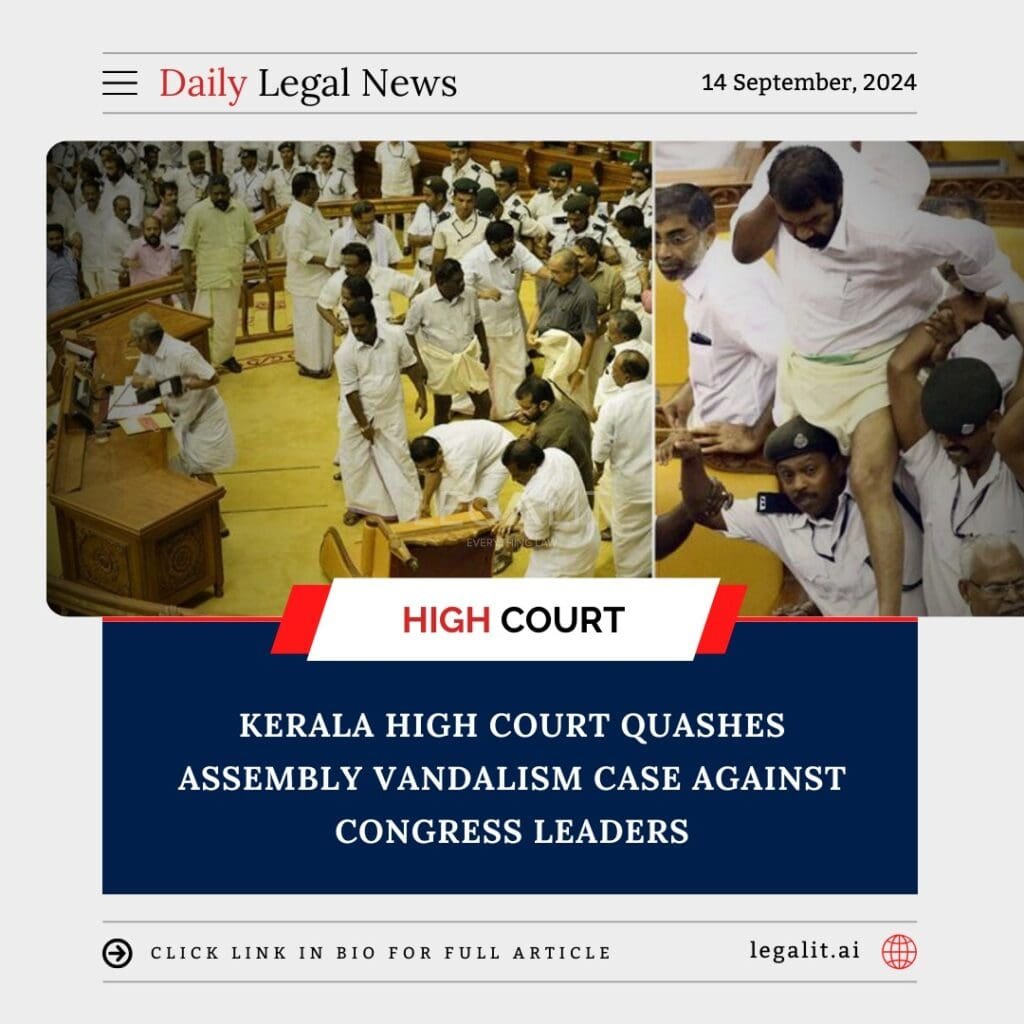
In a major legal victory for the Congress party, the Kerala High Court has quashed the long-standing Assembly vandalism case against several of its prominent leaders. The case, which stemmed from a tumultuous session in the Kerala Legislative Assembly in 2015, had cast a shadow over the political careers of those involved. The court’s decision marks a significant turning point in this controversial legal battle and raises important questions about the intersection of law, politics, and parliamentary privilege.
Background of the Case: The 2015 Assembly Uproar
The case dates back to March 2015, when the Kerala Legislative Assembly descended into chaos during a budget presentation. Congress leaders, then in opposition, were protesting against the ruling Left Democratic Front (LDF) government, accusing it of corruption and demanding the resignation of the then Finance Minister. The protest quickly escalated, with legislators engaging in physical altercations, damaging furniture, and allegedly causing significant damage to public property within the Assembly hall.
Following the incident, a case was registered against several Congress leaders, including senior MLAs, under the Prevention of Damage to Public Property Act, 1984, and for disrupting the functioning of the Assembly. The case became a focal point of political debate in Kerala, with the ruling government pushing for prosecution and the opposition accusing it of political vendetta.
High Court’s Intervention: A Judicial Review of Parliamentary Immunity
The Kerala High Court’s decision to quash the case revolves around the concept of parliamentary privilege, which grants certain protections to elected representatives during legislative sessions. The Congress leaders argued that their actions, however disruptive, occurred within the context of a legislative protest and should be protected under parliamentary privilege.
In its judgment, the court highlighted the unique nature of legislative assemblies, where heated debates and disruptions are often part of the democratic process. The court pointed out that prosecuting legislators for actions committed during an Assembly session could set a dangerous precedent, potentially stifling legitimate forms of protest and opposition within the legislative framework.
Legal Reasoning Behind the Verdict
The court’s ruling was based on several key legal principles:
- Parliamentary Privilege: The court reaffirmed that members of legislative bodies enjoy certain immunities to ensure the free functioning of democracy. It argued that prosecuting members for disruptions during Assembly sessions could hinder their ability to perform their legislative duties.
- Nature of the Offense: The court questioned whether the charges under the Prevention of Damage to Public Property Act were applicable in this case, given that the actions occurred within the Assembly premises and as part of a political protest.
- Separation of Powers: The judgment emphasized the need to maintain a separation between the judiciary and the legislative process. The court indicated that internal matters of the Assembly, including disruptions, should primarily be handled through parliamentary rules and disciplinary measures rather than through criminal prosecution.
Political Ramifications: A Relief for Congress Leaders
For the Congress party and the leaders involved, the High Court’s verdict comes as a major relief. The case had been a point of contention, with the leaders arguing that they were being unfairly targeted for their political actions. The ruling not only clears them of any legal wrongdoing but also restores their political credibility at a crucial time for the party in Kerala.
The decision could also have broader implications for how future cases of legislative disruptions are handled. The court’s emphasis on parliamentary privilege may offer greater protection to legislators involved in protests or agitations within the Assembly, although it also raises questions about accountability for acts of violence or vandalism.
Critics’ Perspective: Concerns Over Accountability
While the ruling has been celebrated by Congress leaders, it has also drawn criticism from some quarters. Opponents argue that the quashing of the case sets a problematic precedent, potentially allowing elected representatives to engage in disruptive or even destructive behavior without facing legal consequences. Critics have expressed concern that such rulings could erode public trust in legislative institutions if elected officials are seen as being above the law.
Additionally, the ruling could reignite debates about the limits of parliamentary privilege and whether it should shield legislators from prosecution in cases where public property is damaged or where their actions disrupt the functioning of democratic institutions.
Conclusion: A Landmark Decision with Far-Reaching Implications
The Kerala High Court’s decision to quash the Assembly vandalism case against Congress leaders is not just a legal victory for the party but also a landmark ruling in the ongoing discussion about parliamentary privilege and the accountability of elected representatives. By reaffirming the protections offered to legislators during Assembly sessions, the court has set a significant precedent that could influence how similar cases are handled in the future.
As Kerala’s political landscape continues to evolve, this ruling serves as a reminder of the complex relationship between law and politics, where the actions of elected leaders, even during moments of chaos, must be carefully balanced against the principles of democratic accountability and the rule of law.